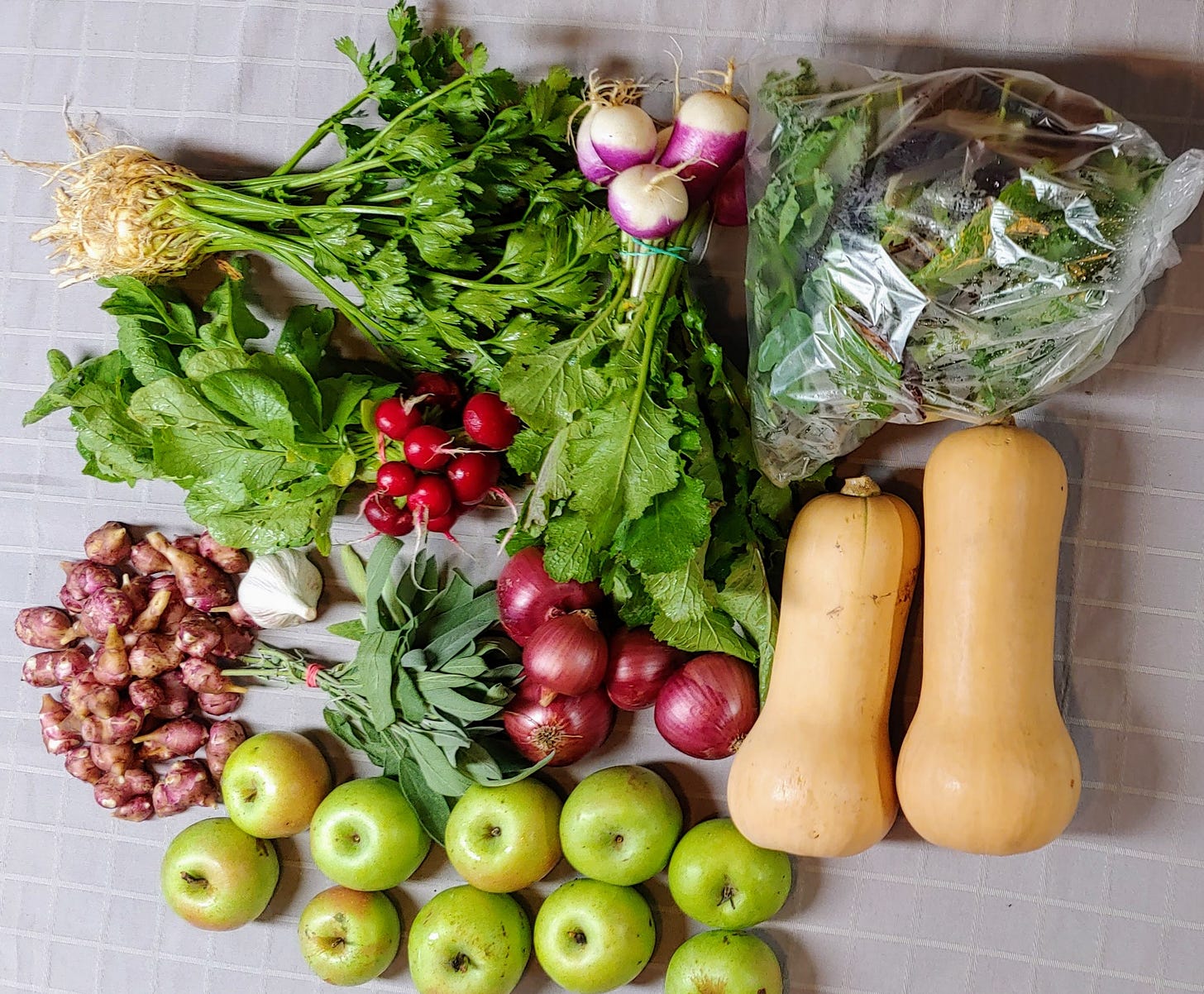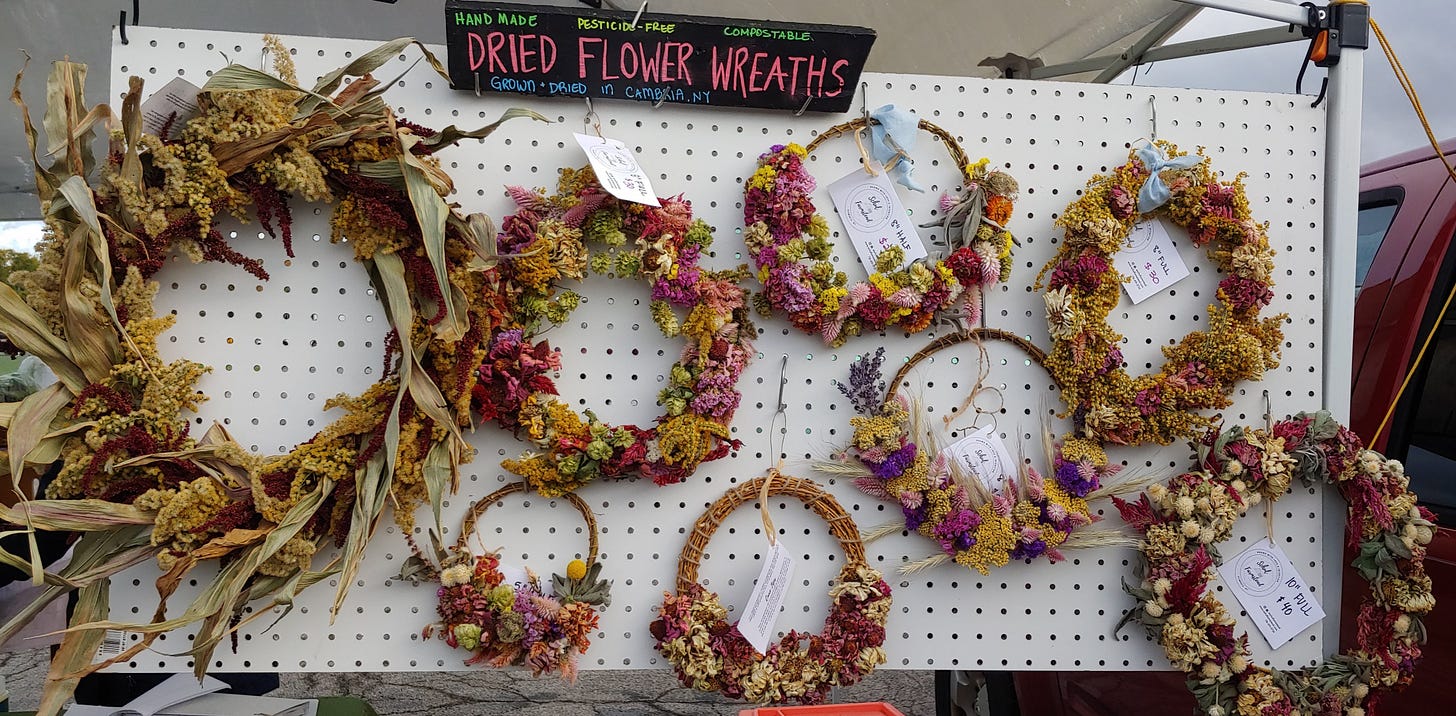February 2024: Growing for You with Love & Intention
We sit in the stillness perfectly between solstice and equinox
Celebrate Love
Join us at the Lewiston Artisan Farmers Market on Saturday, February 10, 9am-1pm at 505 Cayuga Street, inside First Presbyterian’s Fellowship Hall. The entrance is accessible (no stairs) from the parking lot off of South 5th Street in the village of Lewiston.
Love & Intention Beyond Vegetables
Did you know that in addition to 40+ varieties of vegetables, we grow 40+ types of flowers and herbs?!?!?! Like our veggies, they’re grown without the use of any pesticides, fungicides, or herbicides.
Growing herbs and flowers is fun because I get to create with them in entirely different ways! Each of these items can be purchased at the Lewiston Artisan Farmers Market on February 10 to celebrate Valentine’s Day.
Herbal Bath Salts
Our farm-grown herbal bath salts are formulated to make your bath experience extra-special, to deepen relaxation, ease muscle tension, and nourish your skin. We combine our flowers and herbs with USA mined, fragrance-free epsom salts to create 4 skin-loving soaks (see below). Each bath salt comes in a recyclable, reusable glass jar and with a cotton bag.
Relax: Breathe in and out as you melt away stress of the day with our lavender-forward blend designed to reduce inflammation and increase relaxation.
Love: Surround yourself with skin boosting antioxidants in a mixture of rose petals, spearmint, and lemon balm.
Soothe: Calm your winter dry skin with the powerful skin-healing herb, calendula and milky oats.
Winter Solstice: Tap into the anti-inflammatory properties of winter’s snow with our blend of pine needles to soothe away pain and juniper berries to ease stiffness.
Everlasting Flower Wreaths
When you are looking for something special and unique, an everlasting flower wreath might be the answer. Our wreaths are made with flowers, grasses, and vines from the farm. With proper care, each everlasting flower wreath can last for 1-2 years. At the end of it’s life you can compost it or bring it back to us and we will return it to the farm’s soil to nourish future flowers.
Unique Jams & Jellies
We craft our jams and jellies using family recipes that are sure to join your list of favorite things. Our jams & jellies are made with herbs and fruit grown on our farm, or with fruits from Senek Farms in Ransomville. In celebration of Valentine’s Day, we will be offering two special gift packs at the market:
Jam Pack: a gift box of 3 jams with recipes for scones, pancakes, and cookies
Happy Couple Cake Gift Set: Learn how to make a “Happy Couple” cake alongside your S.O. that includes dry ingredients, recipe, and your choice of jam
How Joining Our CSA Can Help Your Family Eat Differently
Do you have a child who doesn’t love to eat vegetables? Create routines and *specialness* around receiving your vegetables each week that bring excitement around the food they are about to eat.
Bring your child to pick up, so they can see where the food is grown and meet the person who harvested their food. When you arrive home, include your child(ren) into preparing the food, whether that’s putting the items away, rinsing them, or choosing a new recipe to try.
Do you want to incorporate more vegetables into your meals, but feel overwhelmed or isolated in starting? Studies show it takes 10 weeks to build a habit. When you join our 20-week veggie subscription we'll help you build healthy eating habits by filling your fridge with nutrient-dense, pesticide-free produce and provide on-going support and coaching.
Bottom line: When you join our CSA, you are not alone. We provide ⤵️
🫑 weekly coaching on how to store, prep, and enjoy your veggies
🥣 a 24/7 accessible e-book of 150+ tasty recipes that take 30-45 minutes to prepare
📂 resources where you can learn more about the nutritional value of your veggies
Being a CSA member is more than getting a weekly share of vegetables; it's about making healthy changes in your life that go beyond the 20-week season.
Learn more about our 20-week CSA Veggie Subscription, share sizes, pricing, and more on our website. Send me an email if you want to chat further! (schulfarmstead@gmail.com)


Growing Together
Reading the Seed Packet
If you’re interested in growing vegetables, flower, or herbs there is SO MUCH information. Like everything, it’s a learning curve! Pay attention to:
Seed Type: Heirloom, Open-Pollinated, Hybrid - what does it all mean?
Heirloom and Open-Pollinated seeds are similar in that they’ve developed their distinctiveness after years of non-human intervention. If basic seed-saving protocols are observed they will grow true to type year after year if you save their seeds. Until about 120 years ago, all crops were open-pollinated. The “heirloom” title on specific varieties have been stewarded by families, communities, regions, and/or small-scale commercial enterprises over many years. Both are in contrast to seed varieties developed by larger seed companies, corporations, universities, and other plant-breeding concerns, which create hybrid seeds.
Days to Maturity
Describes the length of days from being planted as a seed or transplant before harvesting.
Sow Before/After Last Frost
This tells you when to start your seeds indoors (under grow lights) or when its safe to plant the seeds outdoors in the soil. You’ll need to know when your last frost date is based on your geographic location. For WNY’ers depending on your location in the region, that’s somewhere between May 7-June 1. Find out your last frost date.
Full Sun/Partial Sun
Basically all plants thrive in full sun (at least 8 hours of daylight), but some do well in partial sun or shade (4-6 hours of daylight). Figure out the length of sunlight that hits your garden/patio location before determining what you can plant where.
Transplant or Direct Sow
Direct sowing means planting the seed right in the soil outdoors when it is appropriate based on the last frost date. This is the easiest type of growing from seed. Transplanting means you need to grow the seed indoors, sheltered, and then harden off your seedling before transplanting. You will need adequate sunlight, so growing for transplanting will need to be done in a cold frame, greenhouse, or under grow lights in your home.
Want more growing resources? Fruition Seeds in Naples, NY has many open-pollinated, heirloom seeds adapted to WNY’s short growing season & they offer FREE growing guides to help your garden thrive.
Earth Stewardship
We were very happy to read that Governor Hochul signed the Birds and Bees Protection Act into law before the end of 2023. Alongside NOFA-NY, we did advocacy work to encourage the law to be passed by the NYS legislature and signed into law.
Neonics are a class of neurotoxic insecticides used on agricultural crops, lawns, garden plants, golf courses, and in flea and tick pet treatments. They bind to nerve cells of insects and even nonlethal doses, can weaken critical functions, such as an insect’s immune system, navigation, stamina, memory, and fertility. These insecticides are harmful to beneficial insects, pollinators, birds, bees, and soil microbes, as well as the insects they are designed to target.
Ultimately, the bill should provide much-needed protections for New York’s bees, birds, water, and people, and hopefully be a milestone in ending unnecessary and destructive neonic use across the country.
The effective dates for the seed coating and lawn/garden use prohibitions are now Jan. 1, 2029, and Jan. 1, 2027, respectively, and the waiver provisions from the seed coating prohibition have been modified to look more like the Québec model, which successfully reduced neonic seed coating use to almost nothing, while preserving flexibility for farmers.
The state Department of Environmental Conservation (DEC) will have considerable discretion in implementing the law, so advocacy work will continue in the future to ensure that implementation is successful. Read the NRDC's Neonicotinoids 101: The Effects on Humans and Bees brief to learn more.






